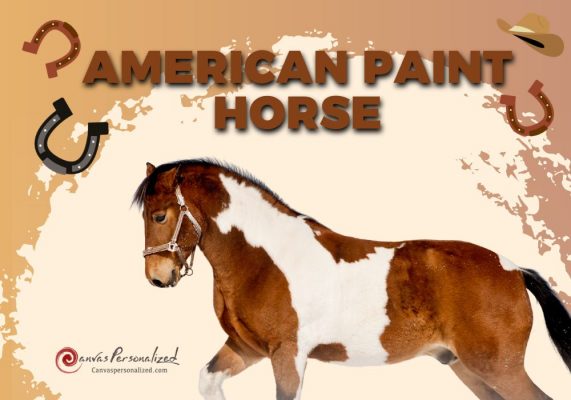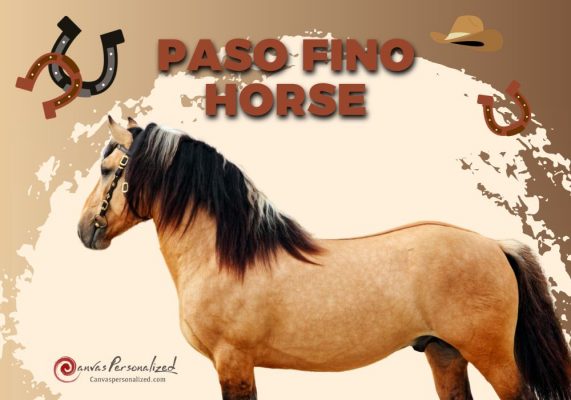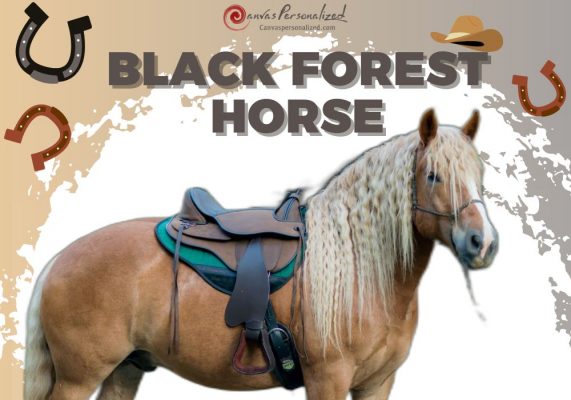The Mustang horse breed is a fascinating and unique breed of horse that has captured the hearts of many. Mustangs are known for their hardiness and sure-footedness, thanks to their wild heritage. These qualities make them ideal as working and trail horses since they can navigate terrain other breeds might struggle with. In this article, Canvas Personalized will explore the history of the Mustang horse breed, its physical characteristics, and current status in the United States. We will also discuss how to adopt or buy a Mustang horse for yourself or your clients.
1. Mustang Horse Breed Origin And History
Mustangs still live in the wild in the western part of the United States. They descended from the horses that the European colonists brought over from Spain. The Native Americans traded for or seized some horses while others fled.
Wild herds of eloped horses were driven further west as human activity spread over the land. As a result, the wild mustang population swelled, creating an issue as the region got more populated and ranchers sought acreage to pasture cattle. There may have been as many as two million Mustangs in the United States in the early 1900s. It is thought that as many as 30,000 Mustangs are still alive today.
The population of wild mustangs increased after legislation passed in 1971 protected them from being shot, poisoned, and tormented. The number of wild mustangs has gotten out of hand, so the Bureau of Land Management has begun gathering and adopting them.
2. Mustang Horse Characteristics Of Appearance
Mustang Horse Breed Size
Mustangs are smaller horses that usually stand between 14 and 15 hands tall and weigh about 800 pounds. They are known for their strong bones and small, powerful bodies.

Mustang Horse Coats
Coat colors in Mustangs range from bay to chestnut, black to grey, pinto to roan to palomino. Their coat is short and shiny, making it low-maintenance.
Mustang Horse Colors and Markings
In addition to their coat colors, Mustangs can have a variety of markings such as stars, stripes, and spots. These markings can be found on their faces and legs.
Mustang Horse Breed Conformation
The sturdy build of a Mustang horse makes it ideal for work and trail riding. A short back, large chest, and powerful legs characterize this species.
Unique Characteristics of the Mustang Horse
Mustangs are distinct from other horse breeds because of the wild ancestry from which they descended. Because of their toughness and agility, they are well-suited to traverse rough terrain. The intelligence and adaptability of these horses make them ideal for a wide range of uses, from trail riding to ranch work to dressage and beyond.

3. Mustang Horse Lifespan
Mustang horse breed tends to live longer in the wild than those kept as pets. The average longevity of a Mustang in the wild is between 15 and 20 years, despite claims that they may live up to 25 years in captivity. This is mostly because of their difficult living conditions and little access to veterinary treatment.
4. Mustang Horse Temperament
The Mustang is a well-known species for its intellect, versatility, and instinct for survival. They are also herd animals with a strong social structure. That makes them approachable and inquisitive, but it may also make them headstrong and unyielding.
Due to their wild origins, Mustangs often have difficulty being tamed and trained. With time and effort, though, they may be molded into loving pets for their owners.
Remember that age, gender, and individual personality may all shape a horse’s temperament. If you want to adopt or buy a Mustang horse, it’s best to deal with a trustworthy breeder or rescue group that can match you with a horse whose personality is a good fit for your lifestyle and skill level.

5. How To Care A Mustang Horse
Diet and Nutrition
Although mustangs are hardy horses that can prosper on a wide range of diets, it is still vital that they get the care they need, including a balanced diet, to guarantee their continued health and happiness. The following are components of a healthy Mustang diet:
- Hay: High-quality hay should comprise the bulk of a Mustang’s diet. Alfalfa hay is a good choice for horses that need more protein, while grass hay is better for horses that need to maintain their weight.
- Grain: Mustangs generally don’t need grain in their diet, but it can be added if they are underweight or have high energy requirements.
- Water: Clean, fresh water should always be available to Mustangs.
Grooming
Mustangs require regular grooming as part of their care. Grooming them regularly keeps their coat healthy and lustrous and allows you to check for any injuries or health problems. How to take care of your Mustang:
- Brushing: You may clean the dirt and debris from your Mustang using a brush with soft bristles. When cleaning your horse, make sure to focus on the places where the saddle and bridle rest.
- Bathing: Mustangs don’t require frequent baths, but it’s best to use warm water and a gentle horse shampoo when you do. Rinse your horse vigorously to remove any traces of soap.
- Hoof care: Keeping your Mustang in good health requires consistent attention to its hooves. Trim your horse’s feet every 4-6 weeks, or more often if necessary.

Common Health Issues
Like other horses, Mustangs can suffer from a wide range of illnesses. Some widespread health concerns include the following.
- Colic: Colic is a general term used to describe abdominal pain in horses. It can be caused by various factors, including changes in diet or environment. Symptoms of colic include pawing at the ground, rolling, and sweating.
- Lameness: Lameness is a common problem in horses that can be caused by a variety of factors, including injury or disease. Symptoms of lameness include limping or favoring one leg over another.
- Parasites: Parasites such as worms can cause serious health problems in horses if left untreated. Symptoms of parasitic infection include weight loss, poor coat condition, and diarrhea.
6. Is the Mustang Right for You?
The Mustang horse breed is a smart, sturdy, and adaptable pet that may be a wonderful friend when paired with the appropriate rider. But they aren’t always the best option. If you’re thinking about adopting or purchasing a Mustang horse, here are some things to think about:
- Experience: You probably shouldn’t have a Mustang without extensive horse expertise. It is recommended that novice horse owners start with a less challenging breed before taking on a Mustang.
- Time Commitment: Caring for a Mustang properly is a time-consuming and involved process. You shouldn’t get a Mustang unless you can give it the attention and training it needs.
- Cost: Although Mustangs tend to be more reasonably priced than other horse breeds, they are still a big financial commitment. Consider the costs of maintaining a Mustang, which includes food, veterinarian care, and more.
- Facilities: The health and safety of Mustangs depend on having suitable housing for them. A stable or barn, perimeter fence, and grazing or turnout area are all necessities.
You should consider getting a Mustang if you are an experienced horse owner and have the means to provide for this intriguing and distinctive breed.

7. Mustang Horse Adopting and Purchasing
A few choices exist for those who want to adopt or buy a Mustang horse. Here are some things to consider:
- Adoption: The BLM controls the Mustang population in the US and has adoption programs for interested parties. While adopting a Mustang may be very fulfilling, it’s vital to remember that these horses have unique needs and require special attention and training.
- Purchase: There are several reputable breeders and rescue groups that focus on Mustangs if you’re looking to add one to your family. If you want to know more about the horse’s history and health, it’s best to deal with a respected breeder or rescue group.
If you’re considering adopting or buying a Mustang horse, you should know that this breed has special needs and requires regular care and attention. Your Mustang’s health relies on several factors, including regular veterinarian checkups, healthy food, and regular exercise.
Age, training, and genetics are just a few variables that might affect how much a Mustang horse costs. Mustang horse price is from $125 to $5,000, far cheaper than other horse breeds. However, there are certain Mustangs that cost more due to their great genetics or training
Read more:
- Unveiling Spotted Saddle Horse Breed: Versatile and Striking
- Discover The Rocky Mountain Horse: Beauty And Versatility Breed
Overall, the Mustang Horse Breed is a special and intriguing type of horse that has won the hearts of many people. If you’re a seasoned horse owner with the means to provide for a Mustang, you could be the ideal candidate for this intriguing and distinctive breed. Read other Canvas Personalized articles to learn more about horse breeds and how to care for them.










